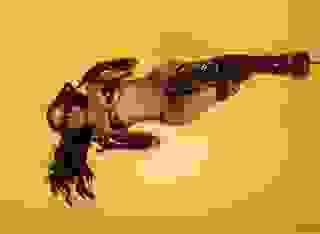- Reviews & Essays
- We Are Frankenstein
Note: You can change font size, font face, and turn on dark mode by clicking the "A" icon tab in the Story Info Box.
You can temporarily switch back to a Classic Literotica® experience during our ongoing public Beta testing. Please consider leaving feedback on issues you experience or suggest improvements.
Click hereThe death of a baby may not be the most intense grief a human can experience. Having not experienced every sort of grief, I couldn't say. I will assert however that it may be the sharpest, the most three-dimensional, the furthest distance to fall. From inexplicable joy, the transformative bliss and complete joyful shift that is pregnancy and birth, to the complete emptiness, the horror of a dead child, is perhaps the greatest emotional distance imaginable.
A million women experience this grief every year. A million monsters, a million failed creators, walk through this grief with their invisible babies held to their cruelly full breasts.
Rain Michael was perfectly healthy, as was I during my pregnancy with her. She died inexplicably, partway through labor. I remember screaming and screaming at the doctor, and then a hallucinatory and horrifying 12 hours in which the nurses helped me give birth to my only child, already limp, already lifeless. I remember going home to an empty house, nothing in my arms and nothing in my mind but screaming, endless pain.
During the next few months I read a lot, anything to keep my mind from showing me the endless movies of those hours in the hospital, anything to keep me from looking at the empty nursery or at the bewildered and stricken faces of those who loved me. I had somehow, for some unknown reason, been unable to present them with the laughing child we had anticipated, and instead held out to them a pale and terrifying ghost, the monster of my dead child and my intolerable sadness.
When Mary Shelley wrote Frankenstein, she was probably recovering from the same event: an inexplicably stillborn child, the greatest joy turned to greatest horror in a single instant. And her book is about the experience we all face, all the mothers with invisible children, the mothers of monsters, the women who hold the shadow of failure and loss, betrayed by their own bodies, their own children, their gods.
In Shelley's book, Frankenstein himself is a pregnant mother, obsessed with the joy and excitement of creation. Like all pregnant women, he's absorbed in his task to the exclusion of nearly everything else; it is the ground and center of his being to focus on the task of creation, the birthing of life itself. He is neither evil nor insane, any more than any pregnant woman. The experiment consumes him with hope, with joy, with overwhelming anticipation. He hopes, like every mother, that his child will change the world. He intends nothing but good from his work; his child, and the science of its creation, will bring new knowledge and life to the sciences, new hope to every person. Every mother hopes to birth a messiah, a savior, a great asset to the world.
The early part of the book focuses on Frankenstein himself, and in his personality one can read all the hopes and fears of a mother, and all the obsession and emotional drive of pregnancy. His days and nights are centered on his work, and he can no more leave the thought of his creation than a pregnant woman can take a break from pregnancy. Once the process is begun, a mother's mind is singular; her body is centered around this explosive stillpoint; her entire being is shifted and she is driven by the growth of an idea that transforms every cell and every thought. She is consumed with joy.
The night Frankenstein is finally to "give birth" is written by someone who has experienced the ecstasy of the early stages of labor: an indescribable rush, the feeling of being on fire with something universal, the single-minded drive toward a sacred goal. He is gleeful, more excited and joyful than he has ever been or ever imagined being. He sleeps, finally, and wakes to a dawn more precious and blessed than he has ever imagined. The world is completely transformed, as it is when we are anticipating, finally, meeting the spirit we have nurtured for so long.
And in an instant, that joy and anticipation is transformed to the most unimaginable horror, the deepest pain, the knowledge that the world has changed and darkened forever, suddenly and inexplicably. Instead of the glorious child he has anticipated, he has created a monster, one that will change his life, and the lives of everyone he loves, for the worse and forever. One that will destroy everything he loves, destroy him, destroy any chance he has had for happiness in this life.
No different, that moment when we find our child dead, when we realize that those who love us will be presented, not with the greatest miracle and the most beautiful savior, but instead with a ghost, a monster, a killer of joy and security, a killer of happiness. Nothing will ever be the same. From the dizziest heights of ecstasy a human can ever experience to the deepest pits of anguish in an instant. The fall kills many of us. Those who survive are transformed forever, made darker, older, broken by the fall.
Now Frankenstein walks the world with an invisible monster. It is no accident that he cannot often see his creation, that he has an invisible horror to present to, or keep from, those he loves. A dead baby is invisible, a source of pain that cannot be seen and isn't even recognizable to the outside world. As Frankenstein moves through the world, he screams invisibly, alienated from everyone around him by the life and death of his child. No one sees his monster; no one understands what failure and grief he carries in his arms.
At this point in the story, the focus shifts to the monster itself, another character who shows us in detail the life of a woman who has lost an infant. Different from the people around, alienated from everything it wants, the monster wanders in shadow and tries to understand its alienation. It is separated from the rest of the world through no fault of its own, as the mother carrying her child's ghost is separated, misunderstood, detached from the world.
Unseen, the monster is at least left in peace. The mother of a dead child can move in peace through the world, through a restaurant filled with children or the baby section of a store, and is unmolested and ignored; her pain is as invisible as the hidden monster. She watches families with children from a keyhole, secretly, from outside in the darkness. She cannot tell them what she knows; she cannot reveal herself for what she is.
And like the monster, when she does choose to show herself, to reveal herself as a mother of a dead child, she becomes a thing to avoid, a monster herself. Pregnant women, women with live babies, will shun her as an embodiment of their fear. Families and friends try to help but in the end cannot sit in the same room with that endless and incurable grief. She is left alone, peering through a crack in the wall at the rest of the world, a house full of happy people which she will never join, a family she'll never have. The monster wandering the fields, consumed with anger and grief which he neither bought nor earned, is the bereaved mother, isolated from society, isolated from anyone who has not lived what she has lived.
It only takes once, one occasion of having to reveal to a stranger that you carry a dead infant in your arms. Experience only once the look of pain on a stranger's face, of awkward helplessness, of horror and pity and judgement, and you will know without a doubt that you are no longer part of the larger world, that you are alone. Better to be alone than suffer the reactions of the people around you when they see your true face. Such was the decision of the monster, to avoid people, and the inescapable conclusion to judge them for their pity, their horror, their helplessness.
What drives the monster is this alienation, and the inevitable rage against an invisible creator, a creator that forced a horrific choice and a terrible destiny on him. It is a creator he fiercely desires to trust and love, one he needs to feel secure and complete. For the mother of a dead child, the creator is God, the World, something ineffable and essential that has broken us, lost our trust, chosen anguish for our path, and who offers no love or nourishment. A god who seems to want to kill us with grief, to punish us for something we didn't choose. Frankenstein's monster struggles similarly; his creator wants him dead, seemingly for no other reason than that he is what he is, something he cannot help or change.
The monster awakes to a hellish world, a world he has not chosen, a world of endless pain and alienation. There is no word for a woman who has lost a baby; she is neither widow nor orphan. Let her be called a monster, then. The least we could do is acknowledge that that is the extent of her distance from the rest of the world, that is the extent to which she can reveal herself without being shunned and pitied and judged. Her life is monstrous, filled with blithe and gleeful sources of pain: diaper commercials, mothers with their children in the store, the cheerful pregnant women, the aisles of baby food and tiny shoes and all those blankets, clothes your ghost will never grow to wear.
There is no absence so tangible, so defining; every object is defined by the loss. A pen is the school supply your daughter will not need, every song is one you will not play for her, this chair in which you might have held her, this shoe she might have tried on, this door you will not have to open or close so that she can sleep soundly. In every object is this absence, in every moment there is a more tangible moment that is not happening: I am not doing this with my child in my arms, or this, or this. I am going here alone, and here and here. To others we look like single people, like women unaccompanied, a simple human. But we are two people now, the invisible one larger by far and all-consuming, defining every space and action in ways no one can see but us. It is easier to be invisible ourselves, to cease to interact. We are monsters living in a monstrous world, and our culture does not see us.
- COMMENTS
<br>
First of all I can't help noticing that people who are abusive in their comments always sign themselves "Anonymous." Driven by their personal fears that they cannot understand because of their extreme shallowness, they proceed to do in writing what is the equivalent of rape. Incapable of actually evaluating the quality of the writing or the effectiveness of the argument, they resort to these gross ad hominem attacks which communicate the nature of their own shriveled souls and say nothing at all about the essay that they are supposedly commenting on. It tells me that the landscape is indeed filled with a host of sad monsters who suffer a lifetime of alienation parasitically preying on the happiness of others and creating more monsters like themselves. <br><br>
Now about your essay: Fascinating employment of Mary Shelley's story that is truer to Shelley than to these rather gratuitous Hollywood renditions that most people are familiar with. We live in a society of alienation where security is sought in the demonization of the "other." To look the "monster" in the eye with compassion in an attempt to understand the monster's sense of themselves in the world is the first step in turning the monster back into a sentient and sensate human being in the full sense of the what it means to be human and, in doing so, enriching our own selves as well. Welcoming the "other" back into the fold is the most noble action possible. It is, in fact, a moral imperative that will help to prevent the mutual annihilation that is the current trajectory of our intolerant, finger-pointing society.<br><br>
I think this essay is a brilliant contribution to the promotion of a loving world and therefore it is quite fitting to appear on a site that publishes, amongst other things, stories about making love. More needs to be said on the topic. More people need to understand Shelley's story untainted by Hollywood crap. I salute you unpredictablebijou<br><br>
How incredibly insensitive some people must be to have written such horrible things to you. Of course I am sure (and hopeful) that they do not know you. And how insightful others who have seen straight to the source of the pain expressed here. Because I know you and love you, I know how deep the pain expressed here runs. I have watched you come through a long tunnel since just after that time and you are emerging tempered by the pain -- great beauty and great strength. Consider yourself hugged.
as per your "disturbing" comments which you refer to at the AH, and you ARE admittedly an attention whore, I would not worry, unless you plan on stalking yourself. It is obvious that YOU wrote them so you could bring attention to yourself. pity-full
Never mind about the person who thought I had not grasped the message I certainly did.I will contact you one way or the other.much love JIM
The comments so far on this very emotional subject indicate the deep concern that is felt by all when a mother loses a child.The dreadful feeling of loss is also felt by the father.It can shake the faith of even the most devout religous people and quetion the existance of GOD.I have the feeling that you speak from personal experience.The saying time heals every thing,does not apply to this.A very well written essay.







